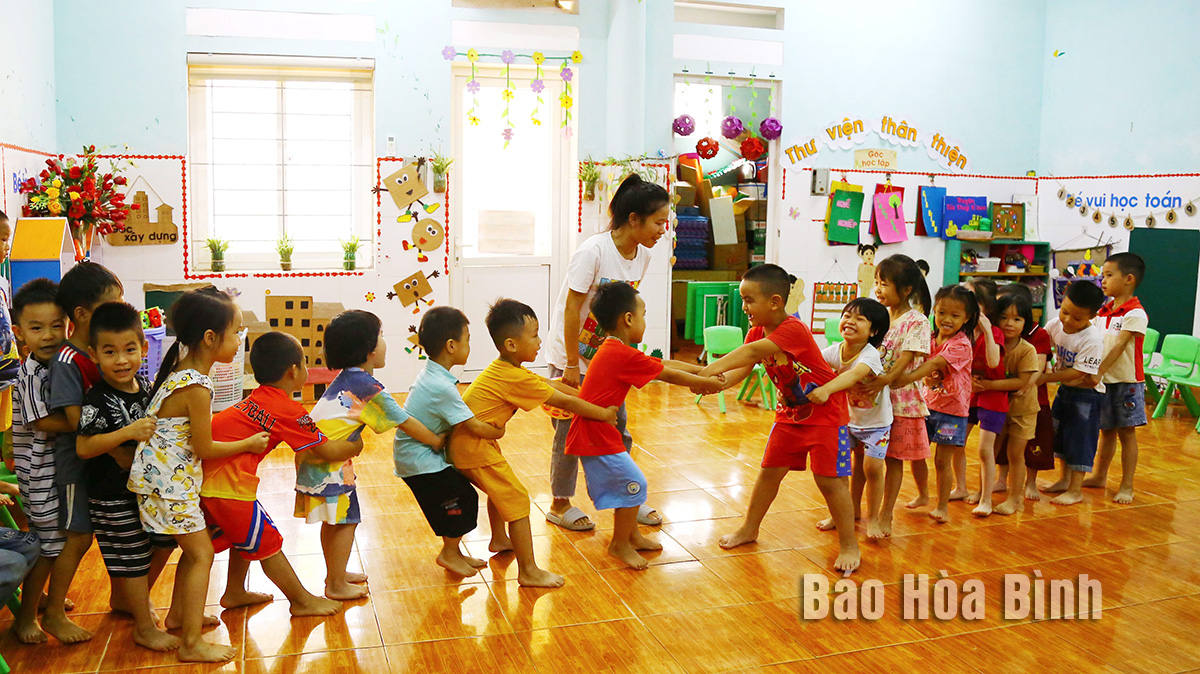
(HBO) - The Vietnamese Party and State always consider education and training as a top national policy, and investing in education as investing in development. Thoroughly grasping the stances, guidelines and policies of the Party and State, over the past years, Hoa Binh province has taken concerted measures on education and training development, with attention paid to well implementing the 11th Party Central Committee’s Resolution No. 29-NQ/TW, dated November 4, 2013, on fundamental and comprehensive innovation in education and training to meet the requirements of industrialisation and modernisation in the context of a socialist-oriented market economy and international integration.

Kindergarten in
Hoa Binh commune, Hoa Binh city, creates a cultural environment for children to
develop comprehensively.
The quality of education universalisation and mass education
is improved year after year. Many active teaching methods and teaching models
in accordance with the 2018 general education programme are implemented,
gradually shifting the educational process from mainly equipping knowledge to
comprehensively developing learners' abilities and qualities.
At a recent conference to summarise the 10 years
implementing Resolution 29-NQ/TW organised by the province, Nguyen Phi Long,
alternate member of the Party Central Committee, Secretary of the provincial
Party Committee, ordered the good implementation of mechanisms and policies for
education and training development.
He stressed the need to pay attention to improving the
quality of teachers and educational administrators by fostering their political
and ethical qualities, and developing their teaching capacity in accordance
with requirements of education and training innovation, building plans to
develop non-public preschools and high schools and those meeting national
standards for the 2023-2030 period, and implementing mechanisms and policies to
attract contributions and sponsorship from individuals, organisations, and
businesses at home and abroad to improve the quality of education.
It is also necessary to ensure equal treatment and create a
fair and transparent competitive environment so that learners at non-public
educational institutions can access educational opportunities and benefit from
the Party and State's educational development policies, innovate methods and
diversify forms of teaching in the direction of developing students' qualities
and abilities, and reform the management of teaching activities, he added.
The Department of Education and Training of Hoa Binh province held a conference on March 18 to review the performance of the "Safe and Happy School" Project and set out tasks for 2025. The project, funded by the Taiwan Fund for Children and Families (TFCF), aims to create a safe, inclusive, and supportive learning environment for students. The event saw the attendance of representatives from the TFCF and 26 beneficiary schools.
With over 70% of their workers being women, trade unions across industrial parks (IPs) in Hoa Binh have been actively safeguarding their legal rights and interests while implementing initiatives to improve their income and well-being.
In recent years, the Hoa Binh provincial General Hospital has continuously innovated itself and improved the quality of medical services to meet the increasing needs of local people. With substantial investments in infrastructure and modern equipment, along with a team of highly qualified doctors and nurses, the hospital has gradually established itself as one of the leading medical units in the Northwestern region and a trusted destination for healthcare for people inside and outside the province.
From mastering the fundamentals of programming to achieving national recognition, the Programming Club of the Le Van Tam Primary School (STAR LVT28) in Hoa Binh city has made remarkable strides in the field of robotics.
The Ho Chi Minh Communist Youth Union Committee and the Vietnam Youth Federation chapter of Hoa Binh province organised a programme on March 12 to launch the "Digital Literacy" movement and an online quiz on the resolutions of the Vietnam Youth Federation congresses at all levels, as well as the Politburo's Resolution No. 57-NQ/TW on breakthroughs in the development of science, technology, innovation, and national digital transformation.
As climate change grows more unpredictable, the development of production forests has become essential - not just for economic growth, but for safeguarding the environment and maintaining ecosystem balance. By boosting local incomes, curbing natural disasters, preventing soil erosion, and protecting water resources, these forests play a crucial role in sustainable development.



